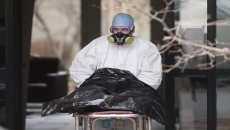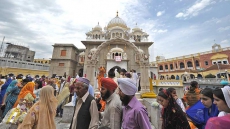Indian agencies alerted Sri Lanka to possible attacks targeting the Indian High Commission in Colombo and churches earlier this month, sources said on Wednesday, two days after eight deadly explosions claimed over 350 people.
The intelligence reports, shared through diplomatic channels, were in connection with National Investigation Agency’s investigation into Islamic State-inspired Coimbatore module’s supposed planned assassinations of some prominent Hindu leaders in south India, officials said here.
NIA has formally filed charges against seven people in the Coimbatore case.
During investigations, agencies are believed to have come across videos of National Thowheed Jamaat (NTJ) leader Zahran Hashim. The videos, taken from suspects in the Coimbatore case, were indicative a militant attack on the Indian High Commission in Colombo, sources said.
After investigations, which included tracking some accounts associated with the Islamic State, Indian agencies told Sri Lanka that churches were likely targets of the module, they said.
Eight blasts ripped through churches and luxury hotels in Sri Lanka on Easter Sunday—the deadliest such attack in South Asia's history.
The videos allegedly showed Hashim asking youths from Sri Lanka, Tamil Nadu and Kerala to establish an Islamic rule in the region.
Suspects in the case are Mohamed Ashiq A, Ismail S, Samsudeen, Mohammed Salauddin S, Jafar Shadik Ali and Shahul Hameed.
The case was originally registered at B3 Variety Hall Police Station, Coimbatore, on September 1 last year.
The NIA believes suspects were radicalised over social media and propagated Islamic State’s militant ideology online. They are believed to have together as a group on June 2018.
The suspects were believed to be in touch with Hashim to join Islamic State.
Sources said investigators said could question the suspects again over the Sri Lankan blasts.
Sri Lanka has admitted to “major” intelligence lapses that led to Easter Sunday bombings.
Top officials have acknowledged that Sri Lanka received intelligence about possible terror strikes ahead of the attacks, but both President Maithripala Sirisena and Prime Minister Ranil Wickremesinghe have said that they did not receive the information.
State Minister of Defence Ruwan Wijewardene, addressing a press conference here, accepted that there had been “major” lapses in the security arrangements.
“We (the government) have to take the responsibility. The President (Maithripala Sirisena) is planning to make some changes in the security establishments,” he said.
“Some of them (the attackers), in earlier incidents, had been taken into custody (after) small skirmishes, but nothing of this magnitude,” Wijewardene said.
Sri Lankan and international media reported that both India and the US provided specific warnings about terror attacks to Sri Lanka, ahead of the Easter Sunday bombings.
President Sirisena on Tuesday assured the nation that he would take steps to curtail terrorism and bring back normalcy swiftly.
He said that he will make some immediate changes in the high security positions as there was negligence in carrying out responsibilities.

The President said that since 2017, there were intelligence information about the emergence of terrorist groups and the fact that some of them were receiving training in foreign countries.
“Our security services kept a close vigilance on these groups,” Sirisena said.
He acknowledged that there were lapses on the part of defence authorities.
Although there was intelligence report about these attacks, he was not informed about them, he said.
Sirisena said that though there were intelligence reports about possible terrorist cells, no legal action could be taken with normal laws without sufficient evidence.
Nine suicide bombers, including a woman, were involved in the massive Easter Sunday bombings that killed at least 359 people, a top police officer said.
So far 60 people have been arrested in connection with the attacks, police spokesman Ruwan Guansekera said, adding that more than 500 people have been injured in the bombings.
The National Tawheed Jamath (NTJ) has been named as the perpetrators by the government, but it has not claimed responsibility for the attacks.
The Islamic State terror group has claimed responsibility for the devastating Easter blasts in Sri Lanka and identified the suicide bombers who were involved in the attacks.
The suicide bombers carried out a series of devastating blasts that tore through churches and luxury hotels in Sri Lanka on Easter Sunday, in the country’s worst terror attack.



